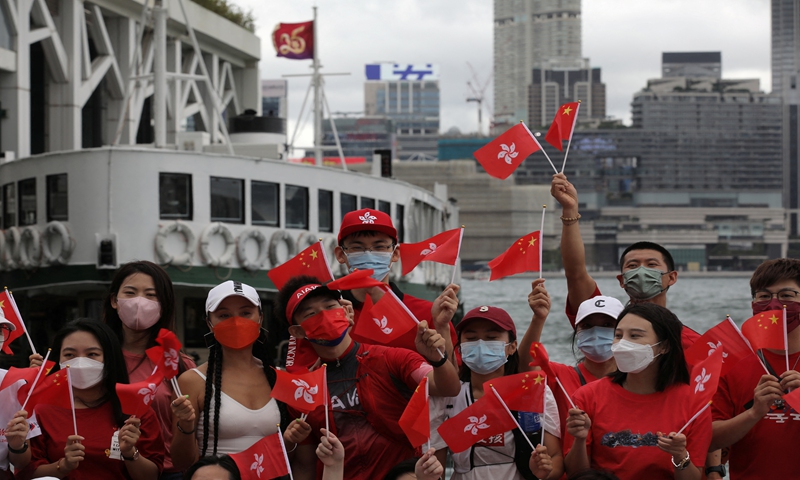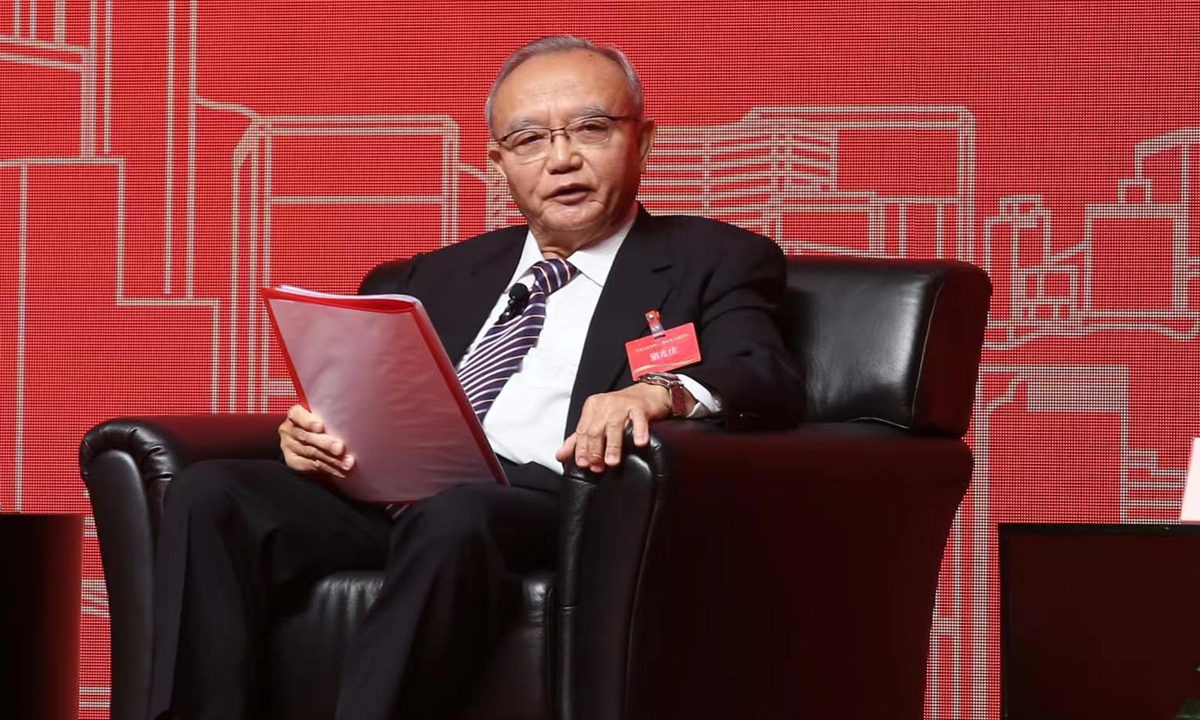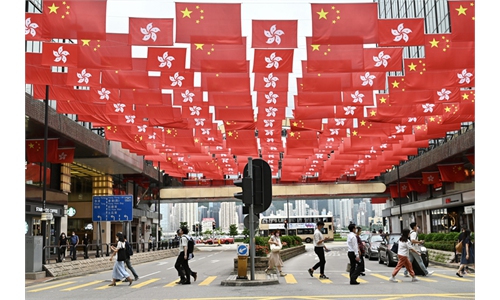HKers who witness changes share increasingly positive attitudes toward CPC: senior political adviser

People wave the Chinese national flag and the flag of the HKSAR to celebrate the 25th anniversary of the city's return to the motherland. Photo: IC
Editor's note: In a report made by Xi Jinping to the 20th National Congress of the Communist Party of China (CPC), which started on October 16 in Beijing, Xi stressed upholding and improving the One Country, Two Systems policy, saying that the policy is a great innovation of socialism with Chinese characteristics, and must be adhered to over the long term. Officials in the Chinese mainland and Hong Kong said that the report provides fundamental guidelines for Hong Kong and Macao-related work. Over the last few years, Hong Kong has experienced unprecedented challenges and witnessed many changes. Global Times reporters Chen Qingqing and Bai Yunyi recently interviewed Lau Siu-kai, vice president of the Chinese Association of Hong Kong and Macao Studies, who is also a senior policy advisor on Hong Kong affairs. Lau, talked about why it's time for Hong Kong residents to learn about the Party correctly, comprehensively, and objectively.
GT: Looking back on the last decade, what sort of path do you think Hong Kong has taken? From political, social, and economic dimensions, what has been the biggest change in Hong Kong over the last decade?
Lau: The last decade has been the most critical period for the practice of the One Country, Two Systems in Hong Kong. During this period, Hong Kong's governance and development have ushered in an important turning point.
Honestly speaking, for a long time after Hong Kong's return to the motherland, the One Country, Two Systems was not fully, accurately, and comprehensively practiced, and many principles such as "only patriots governing Hong Kong" and "administration-driven governance" were not actually implemented. As a result, Hong Kong experienced political turmoil for a period of time with inefficient governance and overlapping social dilemmas, so that the city failed to make good use of the opportunities brought with the overall national development, making its industrial transformation very difficult.
More worryingly, foreign forces and opposition groups that have long been entrenched in Hong Kong had taken advantage of the central government's previous "non-intervention" policy and sought to gain power by strengthening political struggle, seeking to take over the power of governance from the Hong Kong Special Administrative Region (HKSAR) government through running political battles.
After the illegal "Occupy Central" movement in 2014 and the anti-extradition bill movement that pushed the city into serious social turmoil, the central government changed its earlier policy and actively exercised the overall governance that has always belonged to the central government. It cleared the chaos in the city and substantially implemented reforms by implementing the National Security Law for Hong Kong and the electoral reform that ensures only patriots administer Hong Kong. Following these measures, hostile foreign forces and anti-government groups can basically be excluded from the city's governance structure and the goal of only patriots administering the city can truly be achieved.
Overall, the last decade has been a critical period for Hong Kong to move from chaos to governance, which was also an important period for reshaping relations between the central government and the HKSAR. The overall governance of the central government and the high degree of autonomy of the HKSAR have been truly combined, which not only transformed Hong Kong's political ecology, but also created an environment for Hong Kong's political stability and long-term peace and stability in the future.
Hopefully, the HKSAR government and patriots will make joint efforts in the next few years on such bases and gradually solve the deeply-seated problems and dilemmas, accelerating the city's integration into the overall development of the country.

Lau Siu-kai Photo: Courtesy of Lau
GT: In your opinion, what developments and changes have Hong Kong residents experienced regarding their views on the CPC in the last decade?
Lau: In the first half of last decade, Hong Kong was plagued by riots, severe political divisions, and divided social views of the CPC. On the one hand, the participants of the riots, and their supporters and sympathizers, certainly didn't hold positive views on the CPC, otherwise they would not have been involved in those riots. At the same time, as the central government cleared the chaos and restored social order, providing long-lasting momentum for the city's growth, people who witnessed such changes now share increasingly positive attitudes toward the Party.
In the course of the last few years, some Hong Kong residents also realized that a lot of problems in Hong Kong, especially from the impact of external hostile forces, could not be solved by the HKSAR government and local residents. They needed the central government to help quell the riots and, on the basis of social stability, to promote economic growth. This made Hong Kong resident all the more aware of the importance of the CPC to Hong Kong.
Another reality has to be noted: In the first half of the last decade, both internal and external hostile forces in Hong Kong launched a massive campaign of slander against the CPC with false political propaganda, which was also intensified by the Western media, causing misunderstandings about the CPC.
However, in the last two to three years, with the help of the National Security Law for Hong Kong, the central government has greatly reduced the space for those forces to operate in Hong Kong, and their previous anti-communist propaganda became unsustainable. With more efforts in enhancing national identity and security education, some media sources, with distorted facts and malicious propaganda, have gradually disappeared. I hold a positive attitude toward the fact that Hong Kong residents will truly and correctly know the CPC in the future.
GT: In your view, what should the current HKSAR government do to help Hong Kong residents recognize the CPC?
Lau: In today's Hong Kong, it may take some time to improve residents' recognition of the CPC and its role in the historical process of the country as well as its importance to the nation and its contribution to the country's development.
For a long time in the past, the CPC in Hong Kong had maintained a low profile.
However, this situation presently has to change and the CPC should not be so "sensitive" in Hong Kong in the future. Under the basis of the patriots administering Hong Kong and administration-driven governance, Hong Kong needs more support from the central government when confronting Western containment. It's time to comprehensively, correctly, and objectively introduce the work of the CPC to the city.
A new understanding of the CPC will also help Hong Kong residents enhance their sense of national identity, improve the relationship between Hong Kong residents and their mainland compatriots, and accelerate Hong Kong's integration into the overall development of the country
There are a few issues of which to take note. We should get rid of the thinking that we dare not mention the achievements made by the CPC. We should realize that the CPC is the creator, defender, and executor of the One Country, Two Systems policy. If Hong Kong residents believe that the One Country, Two Systems policy is beneficial to Hong Kong, they should support and trust the creator of this policy.
Also, we should recognize the consistency between the interests of the CPC and those of Hong Kong, preventing certain types of political propaganda pushed by certain political forces. Hong Kong residents should also learn about the efforts the central government has made in supporting the economic growth of Hong Kong and further integration into the country's overall development plan will bring more opportunities to the city.
Amid intensifying geopolitical wrestling between China and the US, in addition to the global economic downward pressure, the West could contain and suppress Hong Kong in a more severe and frequent manner in the future, and some of its "special preferences" and growth opportunities that the city can get from the US and the West will be depleted.
This also means that Hong Kong must embark on a new development path for the future. It's the country led by the central government and the Party that can provide it with broad space and momentum for its economic growth and development.


